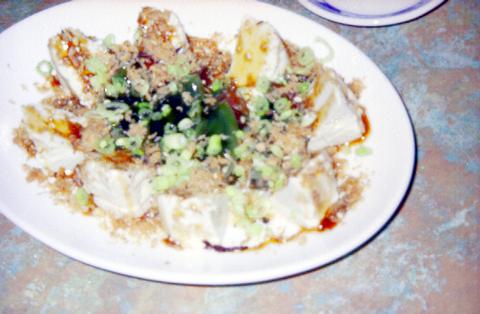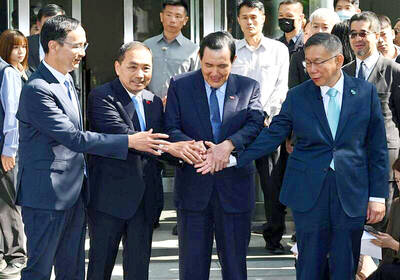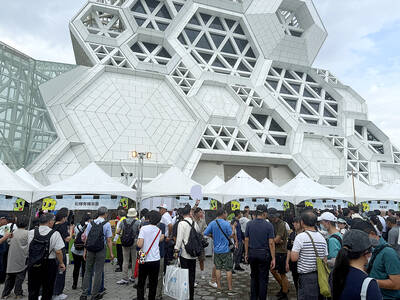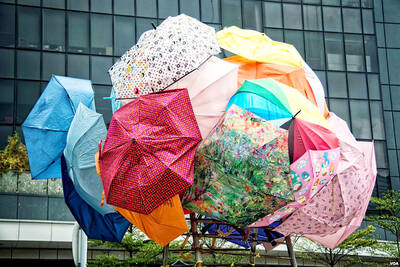Dai's House of Stinky Tofu has another name in Chinese -- House of Unique Stink. It may sound funny to foreigners who are loathe to try the unique dish, but after visiting Dai's, one may find that stinky tofu really doesn't taste as bad as it smells.
Almost every dish at Dai's is made using stinky tofu. There are the typical tofus; steamed, stir-fried, and grilled, but Dai's is the only place in the world, according to owner Wu Hsu Pi-ying (
Decades ago, stinky tofu was a military staple for soldiers patrolling China's borders. But as Taiwan's night-market culture developed, so did stronger, spicier and more diverse flavors of stinky tofu.

PHOTO: YU SEN-LUN
Unlike most night-market stinky tofu stands where the odor permeates the air, Dai's house is simply a clean, ordinary restaurant with a huge Crouching Tiger poster on the wall.
Film director Lee Ang (
The somewhat freaky cold stinky tofu (涼拌臭豆腐) is actually quite refreshing -- similar to, but milder than blue cheese. With its soft and dense texture, it's served with shredded scallions in a light soy sauce and is recommended as a starter.
The raw tofu adds a new line to Dai's 50-year-old menu and is, according to Wu, the healthiest way to try stinky tofu.
In some places, you really don't want to know how the tofu is made, said Wu. Long ago, some used rotting seafood to ferment the bean curd while others used chemicals. But Dai's products are all vegetarian, using amaranth, mustard leaf, bamboo shoots and more than 10 kinds of Chinese herbs to ferment the bean curd for six months, said Wu.
Pure vegetarianism has turned Dai's stinky tofu into something of an urban legend. Seven years ago, Tsinghua University's (
Fried stinky tofu is the least pungent and therefore more suitable for first-timers. The fried tofu of the house (招牌炸) is Dai's flagship dish and has extra-crispy skin and smooth tofu inside. Try mixing the four sauces into your own blend: soy sauce, garlic and radish pastes and chili sauce.
For solo visitors, the tofu fried noodles with spicy and sour sauce (

It’s Aug. 8, Father’s Day in Taiwan. I asked a Chinese chatbot a simple question: “How is Father’s Day celebrated in Taiwan and China?” The answer was as ideological as it was unexpected. The AI said Taiwan is “a region” (地區) and “a province of China” (中國的省份). It then adopted the collective pronoun “we” to praise the holiday in the voice of the “Chinese government,” saying Father’s Day aligns with “core socialist values” of the “Chinese nation.” The chatbot was DeepSeek, the fastest growing app ever to reach 100 million users (in seven days!) and one of the world’s most advanced and

Has the Taiwan People’s Party (TPP) changed under the leadership of Huang Kuo-chang (黃國昌)? In tone and messaging, it obviously has, but this is largely driven by events over the past year. How much is surface noise, and how much is substance? How differently party founder Ko Wen-je (柯文哲) would have handled these events is impossible to determine because the biggest event was Ko’s own arrest on multiple corruption charges and being jailed incommunicado. To understand the similarities and differences that may be evolving in the Huang era, we must first understand Ko’s TPP. ELECTORAL STRATEGY The party’s strategy under Ko was

The latest edition of the Japan-Taiwan Fruit Festival took place in Kaohsiung on July 26 and 27. During the weekend, the dockside in front of the iconic Music Center was full of food stalls, and a stage welcomed performers. After the French-themed festival earlier in the summer, this is another example of Kaohsiung’s efforts to make the city more international. The event was originally initiated by the Japan-Taiwan Exchange Association in 2022. The goal was “to commemorate [the association’s] 50th anniversary and further strengthen the longstanding friendship between Japan and Taiwan,” says Kaohsiung Director-General of International Affairs Chang Yen-ching (張硯卿). “The first two editions

It was Christmas Eve 2024 and 19-year-old Chloe Cheung was lying in bed at home in Leeds when she found out the Chinese authorities had put a bounty on her head. As she scrolled through Instagram looking at festive songs, a stream of messages from old school friends started coming into her phone. Look at the news, they told her. Media outlets across east Asia were reporting that Cheung, who had just finished her A-levels, had been declared a threat to national security by officials in Hong Kong. There was an offer of HK$1m (NT$3.81 million) to anyone who could assist